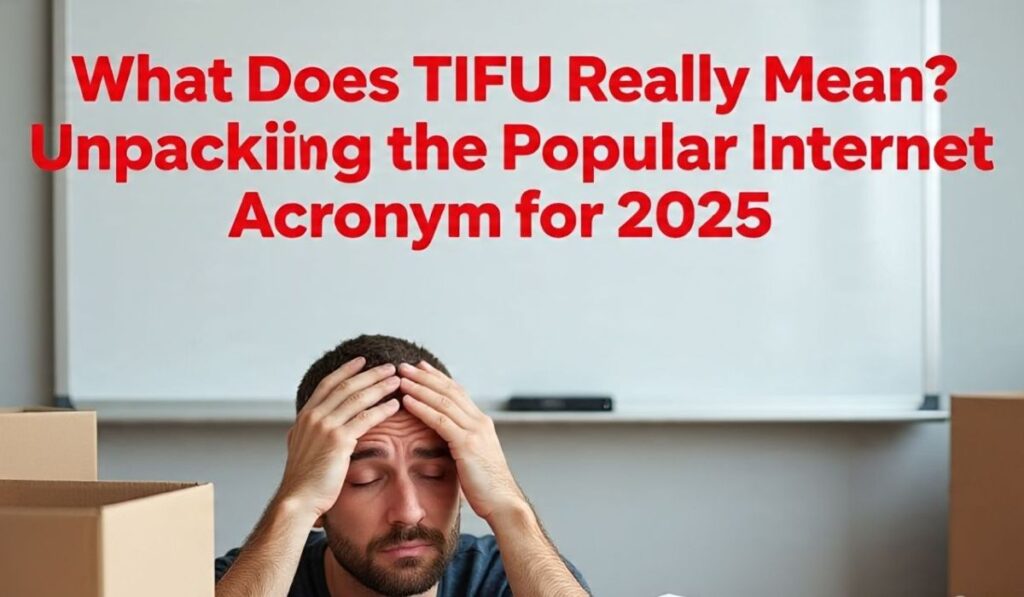In 2025, the acronym TIFU short for “Today I F***ed Up” remains a widely used phrase across internet forums and social media platforms, especially Reddit. Often associated with humorous, awkward, or painfully relatable stories, TIFU posts provide a space where users candidly share their personal mishaps, mistakes, or unexpected failures.
While the phrase might sound intense, it’s typically used in a lighthearted or self-deprecating way, turning everyday blunders into viral entertainment. This guide unpacks what TIFU truly means, how it’s used today, and why it continues to resonate with online communities.
The Origins of TIFU
The term TIFU originated from the Reddit community, where a subreddit titled r/tifu was created in 2013 as a dedicated space for users to share stories about their daily missteps and embarrassing moments.
The acronym quickly gained traction due to its raw honesty, humor, and relatability. Rooted in internet culture, TIFU allowed people to connect through shared human error, turning failures into entertainment. Over time, it evolved from a niche forum thread into a globally recognized internet slang term, symbolizing not just mistakes, but the ability to laugh at them and move on.
Where Did TIFU Come From?
TIFU originated as an internet acronym for “Today I F***ed Up,” first appearing in casual online conversations before becoming formalized on Reddit. Its raw, expressive nature made it a natural fit for users looking to confess their blunders in a humorous way.
While its exact origin is difficult to pinpoint, the phrase quickly spread across various forums and comment threads, reflecting a growing trend of self-deprecating storytelling and relatable content online
The Role of Reddit in Popularizing TIFU
Reddit played a pivotal role in popularizing TIFU through the creation of the r/tifu subreddit in 2013. This platform gave users a specific space to share personal stories of failure, which were often met with empathy, humor, or collective cringing.
The upvote system and Reddit’s wide reach helped many TIFU posts go viral, drawing millions of readers and making the term a staple of online culture. Reddit’s community-driven structure helped shape TIFU into a format that encouraged both vulnerability and entertainment.
How TIFU Became a Cultural Phenomenon
TIFU became a cultural phenomenon by striking a universal chord everyone makes mistakes. Its blend of comedy, honesty, and relatability turned it into more than just a meme or a trend. It crossed over into other social media platforms, inspired YouTube storytime videos, and even influenced how people talk about failure in everyday life.
In an era where authenticity is valued, TIFU posts offered a refreshing break from polished online personas, cementing their place in internet folklore.
How TIFU is Used
TIFU is used primarily as a storytelling format where individuals recount their mistakes whether minor slip-ups or major life blunders with humor and humility. Commonly found on Reddit’s r/tifu subreddit, the acronym usually begins with a post title like “TIFU by texting my boss instead of my friend,” instantly setting the tone for a personal anecdote.
These stories often follow a narrative style, starting with context, building up to the mistake, and ending with the consequences often exaggerated for comedic or dramatic effect. Beyond Reddit, TIFU is now casually used in conversations, tweets, and memes whenever someone wants to share a moment where things went hilariously wrong.
Understanding the Context
To fully grasp the meaning and use of TIFU, it’s important to understand the digital culture it thrives in. TIFU stories are not just about mistakes they’re about the art of storytelling, vulnerability, and the humor found in everyday failure.
The context in which TIFU is used reflects the internet’s growing preference for relatable, unfiltered content. Whether shared for laughs or sympathy, these posts are crafted to entertain, invite engagement, and sometimes even offer a moral lesson.
Common Examples of TIFU
- Texting the Wrong Person: Accidentally sending a private or embarrassing message to a boss, parent, or wrong group chat.
- Workplace Mishaps: Messing up during an important meeting, hitting “Reply All,” or calling a coworker by the wrong name.
- Social Blunders: Forgetting someone’s name mid-conversation or laughing at an inappropriate moment.
- Cooking Disasters: Using salt instead of sugar, burning dinner while multitasking, or setting off a fire alarm.
- Misunderstandings: Misinterpreting a phrase or instruction that leads to an awkward or unexpected situation
TIFU in Memes and Online Culture

TIFU has become a staple in meme culture and online humor, often used to capture the essence of embarrassing moments in a quick, relatable format. Memes featuring the phrase usually highlight small-scale personal fails like autocorrect disasters or awkward social encounters with captions that mimic the classic “TIFU by…” style.
This blend of humor and honesty resonates with digital audiences who appreciate self-deprecating content. As a result, TIFU has evolved beyond Reddit posts into a shorthand expression for failure, popping up in viral tweets, TikTok videos, and everyday online conversations.
The Psychology Behind TIFU
At its core, TIFU taps into a fundamental aspect of human psychology the desire to be seen, understood, and accepted despite flaws. Sharing embarrassing or painful moments online allows people to reclaim control over the narrative of their mistakes.
It creates a space where vulnerability is met with humor and support, reinforcing the idea that everyone makes errors and it’s okay to laugh at them. This digital confessional culture reveals how humor and honesty help people connect through shared imperfection.
Why People Share Their Mistakes Publicly
People share their mistakes publicly for several reasons: to seek empathy, to entertain, and to feel less alone. Posting on platforms like Reddit provides validation, as others respond with laughter, support, or even similar experiences.
This sense of community helps reduce shame and builds a sense of belonging. In an age where curated perfection dominates social media, TIFU stories offer refreshing honesty that’s both relatable and comforting.
The Role of Catharsis in TIFU Stories
TIFU stories often serve as a form of emotional release, or catharsis, for the storyteller. Writing about a mistake and framing it humorously can lessen its emotional sting and help people process the event.
By putting a blunder out into the world, the storyteller gains distance from it and may even turn it into a proud badge of experience. It’s a therapeutic process that transforms embarrassment into laughter and growth.
TIFU’s Influence on Language and Communication
TIFU has shaped online language by popularizing a distinct format for storytelling that blends casual tone, structured narrative, and emotional authenticity. It’s now common to see people use “TIFU” as a verb or shorthand in digital chats, posts, or memes to acknowledge a mistake.
This influence reflects a broader cultural shift toward more open, self-aware communication where imperfection is not just accepted but often celebrated.
The Rise of Internet Slang and Acronyms
In the digital age, acronyms like TIFU have become a fast and expressive way to communicate complex ideas with just a few characters. As internet culture evolves, slang terms and abbreviations help users connect quickly and casually, especially on platforms with character limits or fast-moving threads.
TIFU is part of this trend, offering a shorthand that immediately signals a story of personal failure, usually delivered with humor or humility.
TIFU in Other Platforms
While TIFU originated on Reddit, its influence has spread to platforms like Twitter (X), TikTok, and Instagram, where creators use the format to share short-form versions of their mishaps. TikTok users often pair TIFU stories with dramatic reenactments or comedic voiceovers, while Twitter threads mimic the structure with punchy captions and quick storytelling.
This cross-platform presence shows how TIFU has evolved into a broader internet storytelling style.
Misinterpretations of TIFU
Despite its popularity, TIFU is sometimes misunderstood. Some users take the acronym too literally, expecting only serious or extreme failures, while others assume it always involves humor.
In reality, TIFU can range from mildly awkward moments to deeply personal or even painful mistakes.
Misinterpretations also happen when people use the term without context, leading to confusion over whether a story is meant to be funny, serious, or both.
Common Mistakes People Make About TIFU
One common mistake is thinking that every TIFU story must be exaggerated or fictional, when in fact many are true accounts shared for catharsis. Others believe that TIFU posts must be dramatic or viral-worthy, when everyday fails are often more appreciated for their relatability.
Some new users also post complaints or rants instead of stories with clear narratives, which don’t align with the traditional TIFU style and often get downvoted or dismissed.
Is TIFU Always Lighthearted?
While many TIFU stories are humorous and playful, not all of them are lighthearted. Some delve into more serious territory, involving emotional regret, social consequences, or deeper life lessons.
What sets them apart is how they’re told with a sense of honesty, self-awareness, and sometimes, hard-earned wisdom. Even in darker moments, TIFU allows space for reflection and, occasionally, healing through public storytelling.
The Impact of TIFU on Online Communities
TIFU has fostered a unique kind of digital community centered on openness, empathy, and shared experience.
By normalizing imperfection, it has helped build spaces where users feel safe to admit their mistakes without fear of judgment.
The humor and relatability of these stories bring people together across cultures and backgrounds, reinforcing the idea that everyone stumbles and that those stumbles can be surprisingly meaningful when shared with others.
How TIFU Contributes to Building Community
TIFU (Today I F***ed Up) stories create a unique space for shared vulnerability, where people bond over their mistakes rather than their achievements. By openly admitting errors, users foster a sense of authenticity and mutual understanding, often leading to supportive conversations and humorous interactions.
These moments of collective empathy can build strong online communities where people feel safe expressing their flaws and learning from others without harsh judgment.
The Dark Side of TIFU

While TIFU is often lighthearted and fun, it can also veer into darker territory. Some posts reveal personal traumas, serious legal consequences, or harmful behaviors that receive insensitive reactions.
The anonymity of the internet can invite trolling, mockery, or even doxxing, especially when stories go viral. In some cases, users fabricate stories for attention, undermining trust and authenticity within the community. This darker undercurrent reminds us that not all engagement is harmless or supportive.
TIFU Beyond the Internet
The TIFU concept has extended beyond Reddit and similar platforms into broader conversations about accountability and transparency. People now use the term in casual conversations, podcasts, and corporate settings to describe mishaps or learning moments.
It has become a shorthand for self-awareness and openness, helping individuals frame their failures with humor and perspective, both online and offline.
TIFU in Real Life: Relating Online Experiences to Everyday Life
TIFU stories often resonate because they reflect the kinds of blunders everyone makes but rarely admits. Reading others’ confessions can normalize everyday failures and ease the pressure to appear perfect.
In real life, people might recall a TIFU post when facing a similar situation, turning digital anecdotes into practical wisdom. It shows how online storytelling can influence personal growth and everyday decision-making.
From Meme to Movement: TIFU in Popular Media
TIFU has evolved from a niche Reddit subreddit into a broader pop culture reference. It’s been featured in YouTube compilations, comedy skits, podcasts, and even late-night shows. The meme-like nature of these short, shocking, and often hilarious makes them ideal for viral sharing.
As the media increasingly embraces everyday human flaws, TIFU has become part of a cultural shift toward embracing imperfection with humor and honesty.
Conclusion
In conclusion, TIFU has grown far beyond its simple acronym to become a symbol of online honesty, humor, and human connection. As we move through 2025, it represents not just a way to laugh at our mistakes, but also a platform for storytelling, reflection, and community building.
Whether it’s a minor mishap or a major life lesson, sharing a TIFU moment has become a digital ritual reminding us that everyone messes up sometimes, and that’s what makes us relatable, real, and resilient.

Muhammad Shoaib is an expert writer in Bible meaning, quotes, bible, Prayers, and pick-up lines, known for crafting creative, catchy, and SEO-friendly content that connects and captivates audiences.






